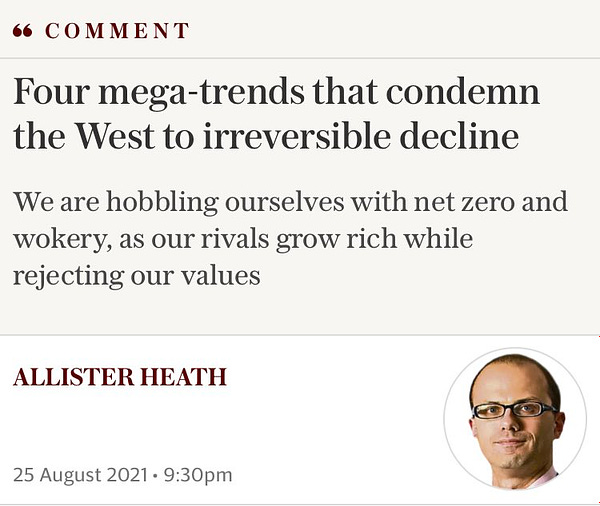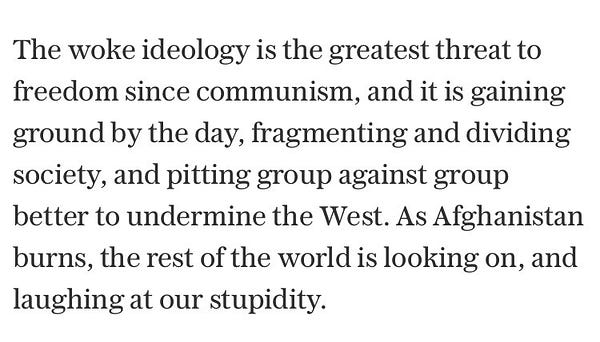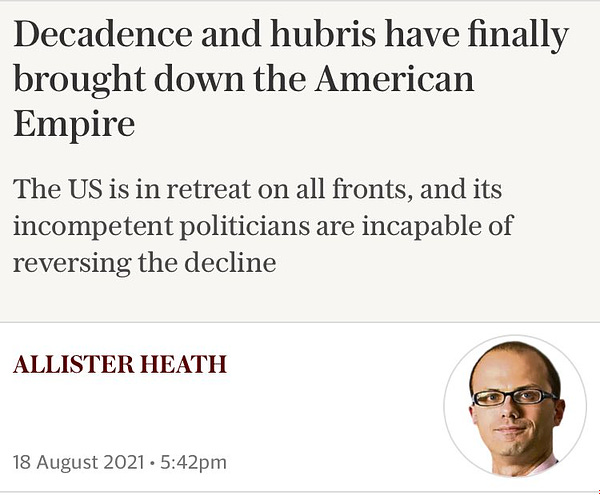The Telegraph’s Taliban: The paranoid style in British newspaper commentary...
Week in week out, columnists like Allister Heath set out to terrify their ageing and angry readership.
There’s a (possibly apocryphal) anecdote about the Turkish Prime Minister Mustafa Bülent Ecevit visiting his Soviet counterpart, Alexei Kosygin, in Moscow on the eve of the Russian invasion of Afghanistan in 1979.
Ecevit is said to have asked Kosygin what the point of the intervention was and Kosygin to have replied:
…to carry Afghanistan from the 12th to the 16th century.
Taking Afghanistan back to a 12th-century state is a pretty good description of the Taliban’s aim during its last period in control of the country, with a dishonourable exception for AK-47s and heavy weaponry.
They banned chess (a 15th-century invention in its modern form), football (which came together in the 19th-century) and kite-flying (recorded as early as 549 but far too frivolous for the Taliban’s liking) along with television, movies and little things like women studying, working, or going outside without male relatives.
The reactionary cell that controls The Daily Telegraph are a little less ambitious in their desires; they just want to drag Britain back to the imagined dark age of the 1950s. The central thesis of the ‘modern’ Daily Telegraph is that it hates Britain — a decadent fallen empire controlled by ‘the woke’ (ignoring the growing hegemony of the right over political and cultural institutions) — and predicts doom at the hands of young people who simply do not hate enough.





One of the chief proponents of this black pill for boomers ideology is Allister Heath, Daily Telegraph columnist, Editor of The Sunday Telegraph, and a recurring character in the poisoned play of this newsletter.
Heath, whose byline picture gives him the look of a particularly evil estate agent smirking proudly to himself about the fart he has just dropped in a crowded lift, contributes a column headlined Four mega-trends that condemn the West to irreversible decline to today’s paper.
After a suitably fearmongering and hysterical lede (“We are hobbling ourselves with net-zero and wokery, as our rivals grow rich while rejecting our values…”) Heath begins with some of his patented historical simplifications:
The West’s Kabul moment, unlike the Fall of Saigon in 1975 or Jimmy Carter’s Tehran hostage crisis in 1979, scenes of previous humiliations, is no false alarm. There will be no bounce-back, no miraculous renaissance: this time the North American-European-Australasian model really is in trouble, as the next stage of the 21st century’s great geopolitical and civilisational realignment begins in earnest.
Imagine you had to sit next to Heath at dinner; you’d try to drown yourself in the soup long before the whole table had been served their starters.
This is the third column in three weeks that Heath has dedicated to this theme and one of many he has curled out onto the Telegraph’s pages since he sloped across from City AM in 2008. The first of his latest trilogy was some jerking off about how great Ronald Reagan was (Biden's woke, Left-wing America is no longer a model for the world) while last week’s instalment had a headline that could easily have been swiped from a Taliban spokesman (Decadence and hubris have finally brought down the American Empire).
In this week’s column, Heath sets himself up as a kind of sour-faced soothsayer, promising to let his readers into “four mega-trends are conspiring to break the West’s grip on the world”. These, he claims, are…
the emergence of non-democratic capitalism
the misuse of technology
the net-zero revolution
America and Europe’s ideological decadence
… and, of course, each is laid out by him in his bald — both literally and philosophically — manner, with each sentence presented as though it were transcribed from a stone tablet thrown down from the mountain top by Margaret Thatcher and Ayn Rand1.
Heath is a huge fan of passive sentences and, since The Daily Telegraph defenestrated most of its sub-editors some years ago, there isn’t really anyone to stop him from sprinkling them throughout his work. He assures us:
It used to be believed that the entire world would converge voluntarily on a Western model. We would wear the same clothes, drive the same cars and eat at McDonald’s.
Capitalism would lead to the universal adoption of democracy, human rights and secularism, buttressed by institutions such as the UN: this Hegelian version of history was as deluded as the Marxist nonsense it replaced.
The McDonald’s line is a reference to Thomas Friedman’s ‘Golden Arches Theory of Conflict Prevention’, first proposed in a 1996 New York Times opinion piece.
It stated:
No two countries that both had McDonald’s has fought a war against each other since each got its McDonald’s.
Shortly after Friedman reiterated the idea in his abysmally titled (and, in fact, written) book The Lexus And The Olive Tree (1999), NATO — whose member states are spilling over with McDonald’s franchises — bombed Yugoslavia (Belgrade’s McDonald’s restaurants were demolished during the conflict and rebuilt when the bombing ended).
Friedman argued in the 2000 reprint of The Lexus And The Olive Tree that he was still right because the war ended quickly as the Serbs didn’t want to lose their place in a global system “symbolised by McDonald’s”. He ignored the invasion of McDonald’s-having Panama by the United States (McDonald’s home nation) in 1989 and the Kargil War of 1999 between India and Pakistan who both have McDonald’s franchises.
The theory has been disproved multiple times since, like many of Friedman’s ideas, but he remains happily ensconced at The New York Times where his latest stab at embarrassing himself in public was a column last week where he pretended to interview Lydon Johnson, Xi Jinping and the last king of Afghanistan, Mohammed Zahir Shah, about the current situation in the country. It was particularly unbelievable because at no point did LBJ boast about the size of his hog or attempt to get it out to show Friedman.2




What Friedman and Heath have in common is the intellectual arrogance to state their beliefs as if they were immutable laws of the universe rather than a bloke saying “I reckon…” Heath is shocked that capitalism can be “non-democratic” because he’s happy to accept the broken electoral systems of the US and UK as actual democracies rather than democracy-flavoured kleptocracies in which the real winners of any election are the entrenched capital interests to whom both main parties are utterly beholden.
To Heath, the only acceptable model of global power is one where the West is dominant. He is, by his own admission, “a libertarian conservative” and therefore horrified that:
… the 21st century will be defined by a range of clashing civilisational models. There will be China, of course, and India, but also Indonesia, Pakistan, Brazil and Nigeria as regional powers. Thanks to capitalism, they will become rich; but they won’t be Western.
Oh, the horror! Other countries with power and spheres of influence who aren’t… Western! If Heath were a celebrity with a signature scent, his would be called White Supremacy, with top notes of bile and sour grapes.
Heath’s next “mega-trend” is the horrifying notion that some politicians might be starting — too little and too late — to take the climate disaster seriously. Writing a horror story to tell Thatcherite MPs who refuse to drink all their port and eat all of their swan, Heath says:
The next big change is that the West is no longer putting economic growth first, while the emerging empires are still desperate to get rich. America and Europe’s embrace of net-zero is largely driven by altruism: its proponents believe that poorer countries will suffer greater harm from climate change than wealthier nations. Yet many of these same nations are planning to make the most of the West’s green turn to reinforce their own rise.
Heath and his friends have benefited from the fire so he wants to keep shovelling coal onto it even if that means the entire world burns. If he was actually capable of connecting his various beliefs into a coherent worldview, he might realise that trying to reduce environmental damage is not altruism by America and Europe at all. If poorer nations become uninhabitable where does Heath think all those displaced people will go?

The next section reveals what a dunderheaded paranoic Heath really is:
Net-zero will also unleash geopolitical chaos: how will Putin respond to the collapse in demand for gas? Could he push Nato and an unprepared, semi-pacifist EU beyond destruction? The Gulf States are also likely to implode, creating a series of additional Afghanistan-like scenarios for America. Last but not least,by bolstering the importance of the rare earth metals such as lithium and cobalt required for new technologies, net-zero will give China a dramatic boost. It has cleverly been seeking to corner the supply of these key 21st resources and is hoping to grab Afghanistan’s plentiful supplies.
You see when the US, UK and Europe tried to secure resources that’s merely being “the world’s policemen” but when it’s China doing it then that’s a sneaky plan. Similarly, Heath appears to be arguing that we should keep using gas forever lest it angers Vladimir Putin and that the only way of dealing with the Middle East is to keep buying oil so that the autocracies there keep their violence within their borders3.
For his third and fourth “mega-trends”, Heath moves away from global diplomacy to the important issues of people calling him an undercooked egg on Twitter and the ‘censors’ that won’t allow him and his pals at The Spectator to say racial slurs whenever they like. He continues:
Technology, and its misuse, represents the third great paradigm shift. In the West, social media, in particular, has had a catastrophic, corrosive impact on attention spans, the quality of discourse and, paradoxically, the ability to think freely. Bullying and hate are the norm, squeezing out reason, kindness and support for free speech. It has dramatically exacerbated tribalism and extremism.
The way Heath writes about social media is exactly the same as earlier versions of his sort of conservative scaremonger talked about printing, paperback books, the Walkman and the internet in general.
Similarly, I could take the sentence “Bullying and hate are the norm, squeezing out reason, kindness and support for free speech,” and apply it to the very newspaper that plays host to Heath. Because while he and his colleagues hoon on about ‘free speech’ incessantly they are actually defenders not of the right to free speech but the freedom of right speech.4
Bringing his column to a conclusion with his fourth “mega-trend” (“We are turning our backs on the values that made us great.”), Heath returns to his favourite rhetorical trick: ‘Scary’ statements delivered without evidence. He writes:
Support for capitalism is dwindling at the very time when every other society has embraced it, and many would rather see mob rule than the rule of law. In the US, the young are less likely to support democratic values than the old. There is growing scepticism about reason and the pursuit of truth. Universities are going back to their obscurantist roots, putting identity politics before knowledge. Many believe meritocracy has gone too far. We are even seeing a resurgence of neo-Lysenkoism, whereby politics trumps science.
The woke ideology is the greatest threat to freedom since communism, and it is gaining ground by the day, fragmenting and dividing society, and pitting group against group better to undermine the West. As Afghanistan burns, the rest of the world is looking on, and laughing at our stupidity.
The fact that Heath compares ‘wokeism’ — a scabbed-over distortion that right-wing columnists pick at endlessly — with Communism is instructive. Since the fall of the Soviet Union, the paranoid right of which Heath is a loud and proud member has often had to create new bogeymen to place beneath the bed, the reds having vacated it.

I’m laughing at Heath’s stupidity but I also find it deeply unsettling. He has a national platform and is treated as a serious commentator. His job is to keep his readers — ageing, angry and alienated despite their relative wealth and comfort — afraid of the coming revolution despite the right being in government and increasingly marching through the institutions. The culture war can only be justified if the enemy seems suitably threatening.
While the Taliban are keen to reach back to the 12th century, Kosygin was aiming for the 16th, and Heath dreams of a fantastical 1950s, I need only reach back to 1964 to find a description of what The Daily Telegraph is doing. In The Paranoid Style in American Politics, Richard Hofstadter wrote:
American politics has often been an arena for angry minds. In recent years we have seen angry minds at work mainly among extreme right-wingers, who have now demonstrated… how much political leverage can be got out of the animosities and passions of a small minority.
… Events since 1939 have given the contemporary right-wing paranoid a vast theatre for his imagination, full of rich and proliferating detail, replete with realistic cues and undeniable proofs of the validity of his suspicions. The theatre of action is now the entire world, and he can draw not only on the events of World War II, but also on those of the Korean War and the Cold War. Any historian of warfare knows it is in good part a comedy of errors and a museum of incompetence; but if for every error and every act of incompetence one can substitute an act of treason, many points of fascinating interpretation are open to the paranoid imagination.
Read Health’s columns and you see how he benefits from nearly six decades more history which he can distort in the service of his predictions of doom.
The paranoid style is alive and well; a parasite in the fearmongering pages of
The Daily Telegraph.
I have no proof that this is what Heath dreams about on a nightly basis but looking at his face and published work I believe it’s a strong hypothesis.
Seriously. Here’s LBJ ordering some pants.
We’re not meant to talk about how the Saudis continue to fund terror across the world. It’s just not polite.
Yes, I know I’ve used this line a few times before but I think it bears repeating.




